Text
[Book Rec + Reaction/Thoughts] The Lantern and the Night Moths 灯与夜蛾 by Yilin Wang
An anthology of translated poems by five modern or contemporary poets and accompanying essays by the translator, @yilinwriter.
You can find the pronunciation guide and list of corrections here!
The cover art, a beautiful expression of the tone of this collection, is by Taiwanese artist Ciaoyin (check out her gorgeous insta!). I'm looking forward to the arrival of the physical book as my tab absolutely does not do it justice xD

Anyway! The official release date is 02 April 2024 though there have been some very thoughtful reviews by early readers already. Here, here, here and here.
(It was an ARC that I received too… though in the time it took to put this together, the ebooks have already gone out to readers >.< typical snail yj!)
Instead, I’ll tell you who I think would be interested in this book or might benefit from reading it, then share things that are cool about it from the perspective of a bilingual hobbyist translator + lover of ancient poetry and lyrics.
Who should read it?
If annotations, translator’s notes and reflections spark joy for you...
If you’ve ever read poetry translations and been intensely curious about what goes on under the hood...
If you’re a translator yourself wanting to hear another voice...
Definitely check this out!
Also if you’re CN+EN bilingual and have ever read something in English that references Chinese terms and concepts etc. except ONLY in English, pinyin or wade-giles and been utterly frustrated by the ensuing guessing game (like me) Fear Not.
That will not be a problem here.
I really appreciate how Chinese words are used naturally where needed for concepts and quotes - they are also translated for those who can't read Chinese so no one is left out. It made this book of and about translation (and more) super comfortable to read! The solution is so simple, so direct, so rarely used that I am amused.
Oh, but do note that the Chinese characters are in simplified though!
The poems are organised by their writers who are listed here by order of birth year, not appearance in the book:
秋瑾 (Qiu Jin, 1875 to 1907)
废名 (Fei Ming. 1901 to 1967)
戴望舒 (Dai Wangshu, 1905 to 1950)
小西 (Xiao Xi, 1974 to _)
张巧慧 (Zhang Qiaohui, 1978 to _)
Altogether, that covers nearly the last 150 years up to now. I’ve never really been into poetry by poets in such relatively recent times, in part because I’d been holding on to this stereotype of them spurning Classical Chinese and ancient poetry in the first half of the 20th century (not entirely true, as I came to realise xD). It made sense and was understandable, but felt sad.
Yet am I the target audience for this book?
Very much so.
In ways I didn’t think I would be too! It was so much fun to experience this both as a reader and a translator that I thought I’d share it here, where we are appreciating Chinese poetry together.
If you didn’t think you’d enjoy modern Chinese poetry, hey, give it a chance!
Oh yeah - on the way home a while back, I was talking to a friend about translation and was surprised to hear that her impression was that it ought to be a straightforward process. Like isn’t it a 1:1 conversion? At some point, ‘what’s the difference between something google translate might return, and how you would say it?’ was asked, and oh that was a delightful question to my ears! I showed her one of my comparison sheets where an original text is laid out alongside multiple translations line-by-line, briefly explaining some common and unique choices and how the people who had translated those probably arrived at the various interpretations. She was pretty amazed to see that the answer to her question was: very different. Hey, it’s a complicated process!
But there’s only so much one can explain in the space of a train ride. That’s why The Lantern and the Night Moths is a book I would also rec to someone like this friend of mine - open minded and curious but never having the chance to think about or encounter the craft of translation.
Like Yilin says, ‘the meaning of a word cannot be fully expressed in one single translation, nor through a series of translation attempts’. She then explains why with great attention to detail and some solid examples from one of the poems with word choices loaded with subtle connotations :D
What's interesting about it?
Okay, for one, Yilin shared a playlist of music that she listened to while working on this book. Here is the link to the spotify one and the one on youtube. Check them out! They sure put me in the mood to read xD (favs: 别知己, 小神仙 & 去有風的地方) Afterwards, this made so much sense like - ah! an audio moodboard.
She's also putting together these adorable mini profiles of each poet along with a cmedia and tea rec to match their vibes. Go see them on her instagram xD
Now to business...
structure
What really helped keep the reader’s focus was the way each section is organized, how the poems and accompanying essay were presented and finally the short bio of each person right at the end.
The poets are first introduced through five or six of their poems, works well suited to this purpose. Their voices, distinct through the vision, ambition and emotion of their words, are brought across by Yilin’s sensitive, thoughtful and poetic translations into English. These translations were also creative and transformative in a way that made so much sense after reading one of her reflections on the process, how she ‘must guide it with gentle hands to ensure its spirit is kept alive and intact during this transformative, and often excruciating process’. A rebirth into another language!
Personally, I’ve come to think of reading translations as looking at a work through another’s eyes. So it’s delightful when the translator’s presence is discernible, and even more so when the reader is given insight into their intention and process via commentary.
Yilin’s essays coupled with the poets’ bios at the end provide a means to go back and appreciate their works in context of their circumstance and inspirations. Similarly, to read the translations with a changed perspective.
I don’t know how much of a thing this is with translated poetry anthologies in English - can count the number I’ve read with both hands lol, and they’re all of the ancient chinese poetry variety - but I really like this design.
drawing on poets who came before them
Remember how we’re always recognizing traces of inspiration from ancient works (to them) in poetry of the various dynasties? 李商隐 Li Shangyin of Tang for example, was influenced by 楚辞 Verses of Chu and folklore and mythology such as that in 山海经 Classic of Mountains and Seas, 李白 Li Bai frequently references poets and history of the 魏晋 Wei-Jin era, and 王维 Wang Wei was clearly familiar with Buddhist scriptures which were translations themselves!
Just like the late Táng poets whom he praised for boldly deviating from the voices before them, Fei Ming used popular references and tropey shorthands ‘in contexts utterly different from the original, reimagining them anew’. Dai Wangshu, too, ‘boldly re-envisioned what modern poetry could look like by revisiting the classics’. In fact, in his very relatable ‘To Answer the Visitor with Classical Imagery’, I see Li Bai’s 春夜宴桃李园序, Qu Yuan’s 离骚 and lots of - as the title says - classical imagery, as if pulling out painting after painting to describe a feeling.
And Dai Wangshu’s faith in the translatability of poetry, that ‘poetry isn’t what is lost in translation, but rather, what survives it’ reminds me of what a friend, @xiakeponz, said that I agree with so much - because readers can ‘experience something in their own individual way through (your) shared humanity rather than language alone’.
poetic tradition and beyond
Between the lines of contemporary poets Zhang Qiaohui and Xiao Xi, I can really see the charm of plain vernacular, how it can be beautiful, incisive and clever in turns. Even as it seems to have moved further than ever from the structure and language of literary Chinese, the themes that inspired common motifs remain a part of life. Mother and divinity, homesickness, finding oneself, tributes to admirable spirits and the issues that trouble society - just in a new form and with different ways of expression.
Qiu Jin
So many FEELINGS about what Qiu Jin was doing - ‘I awaken the spirits of women, hundreds of flowers, abloom’. I would love if she could see the world now. So many things for her to rouse and fight against, but at the same time just as many to be proud of. I am so in awe of her, but now hearing her loneliness and struggle there is a soft spot in my heart for those too.
conclusion
So so so…
Qiu Jin’s admirable fire and lonely resolve. Zhang Qiaohui’s precious ability to express beauty in the mundane and in pain. Fei Ming’s utter delight! He is having so much fun and when* I’m vibing, I feel it too. Xiao Xi’s critical eye and keen observation of the world. Dai Wangshu’s whimsical charm and passion for translation. Finally, Yilin Wang, the connecting thread wound through them all, bringing them together so that we may be acquainted.
*Reading his poetry is like unwrapping a seamless, many layered present. A gift that keeps giving - if only you have a key 😅 Fortunately, Yilin has halved our struggle 🤣
I’ve had such a great time with them all. And if you come, I hope you will too!
#The Lantern and the Night Moths#chinese poetry#Yilin Wang#poetry in translation#灯与夜蛾#Qiu Jin#Zhang Qiaohui#Fei Ming#Xiao Xi#Dai Wangshu#rambly reviews#i read from Fei Ming onwards on my kobo LOL but that one has no colour so...#i might do more of these review-y rambles about poetry things if y'all are interested?#i've been reading LOL#some are chinese some are english#all of them fun and enlightening
24 notes
·
View notes
Text
Don't feel bad! This is awesome :D!!!!!! Thank you so much for sharing about this poem and its significance in daomu biji (@liberty-or-death This may be of interest to you). It's exactly this sort of aha! recognition of allusions and easter eggs in the wild that I write for.
/There is so much depth to Chinese poetry to explore, and seeing how it's still so relevant and continues to be a part of people's lives is delightful to me.
Also! 👀 curious to know which line of the poem was used for this chapter title and if there are more.
新添声杨柳枝词 - Newly Added Melody to Willow Branch Lyric
by 温庭筠 (Wen Tingyun, ~812 - 866)
井底点灯深烛伊,
jǐng dǐ diǎn dēng shēn zhú yī,
At the well’s bottom, lighting a candle in the deep, illuminating you;
At the well’s bottom, lighting a candle, my words for you are heartfelt.*
共郎长行莫围棋。
gòng láng cháng háng mò wéi qí.
accompanying you, my dear, in a game of changhang but not weiqi.
They’ll accompany you on your journey long. On the promised return-date, do not renege.*
玲珑骰子安红豆,
líng lóng shǎi zǐ ān hóng dòu,
Dainty, lively ivory dice - red bean inlaid;
入骨相思知不知?
rù gǔ xiàng sī zhī bù zhī?
of this bone-deep yearning, are you aware?
*Alternate reading of the line based on homonyms of certain words.
Keep reading
#also sorry it took me so long to respond lmao#i thought i'd done it already but apparently it was all in my head 🤣#replies#dmbj fandom stuff
53 notes
·
View notes
Text
春怨 - Spring Bitterness
春怨 - Spring Bitterness
by 刘方平 (Liu Fangping, ~Kaiyuan Era, 713 to 741)
纱窗日落渐黄昏
shāchuāng rì luò jiàn huánghūn
Beyond the silk window, the sun sets, yellow fading into dusk.
金屋无人见泪痕
jīnwū wú rén jiàn lèihén
Within the gilded house, no one is here to see her trailing tears.
寂寞空庭春欲晚
jìmò kōng tíng chūn yù wǎn
In the lonely silence, in the empty court, Spring longs for the close of day.
梨花满地不开门
líhuā mǎn dì bù kāi mén
Parting’s blossoms carpet the way… to a door that does not open.
..............................................................................................
春怨 | Spring Bitterness is one of two homework poems (the other is 月夜 | Moonlit Night), for a poetry translation workshop hosted by Chenxin Jiang that ran from Jan to Feb of this year. Both are from the anthology 唐诗三百首 Three Hundred Tang Poems and were written by the Tang Dynasty poet and artist Liu Fangping.
Side note that no one asked for but that I always feel obliged to mention xD: Three Hundred Tang Poems does not collect the best of the best Tang poetry, that wasn’t the intention! Compiled by 蘅塘退士 Retired Master of Hengtang in 1763, Qing Dynasty, these were mostly popular works and poets from the Tang Dynasty during the Ming/Qing Dynasties (probably skewed toward his own preferences too lol) intended for a beginner or a child's gentle introduction to Tang poetry. This is also why many modern editions you will find at the bookstore today have the poems organized according to poetic form.
Poetry and Song
youtube
I found this cool video of a teacher, 吳秀真 Janice Wu, first reading Liu Fangping’s 春怨 then singing it in Hokkien. Sharing this here so we can appreciate the rhythm, rhyming and their effect in the poem together!
To help this along, another line which represents the tone pattern has been added. In Pinyin, the romanization system for mandarin which is used here, there are four tones.The first (◌̄) and second (◌́) tones are Level - longer sounds that are represented by the ‘_’ underscore in this notation. The third (◌̌) and the fourth (◌̀) pinyin tones are Oblique - shorter sounds represented by the ‘\’ backslash. The third tone is one that starts level, dips, then goes up again, and the fourth has an almost staccato rhythm. Words with Oblique tones are also bolded in the pinyin.
纱窗 | 日落 | 渐 | 黄昏
gauze window | sunset | gradual | twilight (lit. yellow, darkening)
shāchuāng | rìluò | jiàn | huánghūn
_ _ \ \ _ _
金屋 | 无 人 | 见 | 泪痕
gold house | no one | sees | tear tracks
jīnwū | wú rén | jiàn | lèihén
_ _ _ _ \ \ _
寂寞 | 空 庭 | 春 | 欲 晚
lonely silence | empty hall | Spring | desires lateness
jìmò | kōng tíng | chūn | yù wǎn
\ \ _ _ _ \ \
梨花 | 满 地 | 不 | 开 门
pear blossoms | fill floor | no | open door
líhuā | mǎn dì | bù | kāi mén
_ _ \ \ \ _ _
Title
Now to the title - 春怨 chūn yuàn (lit. Spring Laments). There is a trope in poetry called 怀春 huái chūn embracing spring (lit.). You may have heard of the sexual connotation, and it can be that! But a lot of the time 怀春 is also a romantic thing. Being attracted, being drawn by beauty like the bright and lively sceneries of Spring, it’s natural to want to share the moment with someone close to her.
A twist on this trope comes when that person - a lover, a husband - isn’t around or can’t be around. There could be lots of reasons, ok? Like being called away to war, separated because of politics, posted to distant counties and difficulty uprooting the family to move for a three-year thing - in other words, life giving lemons in general or simply that his heart is not here. But whatever it may be, this is how you get a flaw, a regret, a dissatisfaction, some unhappiness in a life... and now we feel 怨.
Spring itself is also very about the world waking up again, a time of renewal where life is everywhere (or the seeds of it are being sown… literally!) and the year is young. A person’s youth is also often compared to Spring, and its passing or a ‘wasted youth’ is something worthy of regret.
The genre of poetry in which the speaker or main focus is a sorrowful lady usually for any form or combination of the mentioned reasons is called 闺怨 guī yuàn boudoir repining. It’s also called 宫怨 palace lament when the focus and setting is on the ladies - the empress, a concubine and so on - in the palace. (Roughly 10% of the Three Hundred Tang Poems are of the boudoir/palace repining genre. I really can’t help but wonder if this is one of the editor’s favoured tropes.) Such poems could be written by ladies, but the theme was often co-opted by men who used it to express adjacent feelings e.g. not being appreciated by their bosses (xD), failure to attain office via the state exams and so on. This is what has happened here for our poem of the day.
So now, Liu Fangping, what laments do you have for us this Spring?
[Family background check, praise and gossip - come get the scoop on Liu Fangping, beautiful man and mountain hermit from the Height of Tang Dynasty.]
Reading
The setting for this poem is in someone’s room, before their window. From it, they can see the fallen pear blossoms across the floor outside and the closed door.
Time for clue hunting to get some more context.
Who
The use of 纱 shā gauze, a light silk with an especially airy weave, as window screens was not something the average commoner family could afford.
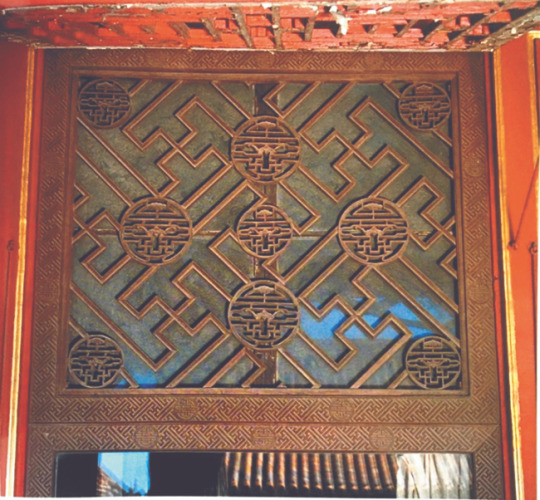
(Source)
We know the POV character is in their room and facing their window, enough to observe the sunset. They must be indoors. What sort of building? The next line tells us it’s a 金屋 jīnwū, literally translated, that would be golden house - but this is should not be taken literally. This is actually a reference to the ‘urban legend’ (or maybe RPF as we call it these days LOL) that gave rise to the idiom, 金屋藏娇 jīn wū cáng jiāo a golden house to keep one's mistress (lit.).
As collected by 班固 Ban Gu (32 to 92 CE) in his 汉武故事 Stories of Emperor Wu of Han, the story goes:
数岁,长公主嫖抱置膝上,问曰:儿,欲得妇不?胶东王曰:欲得妇。长公主指左右长御百余人,皆云不用。末指其女,问曰:阿娇好不?于是乃笑对曰:好!若得阿娇作妇,当作金屋贮之也。长主大悦,乃苦要上,遂成婚焉。
(Rough translation because I want to SLEEP)
When he was couple of years old, the Grand Princess, (Liu) Piao carried him, put him on her knee and asked, “Child, do you want a wife?”
The Prince of Jiaodong said, “Yes,”
The Grand Princess pointed out over a hundred palace officials - similar to ladies-in-waiting - all of whom were refused. Finally, she pointed at her own daughter and asked, “Would a’Jiao suit?”
And he smiled and said in reply, “Perfect! If I were to have a’Jiao as wife, I would build her a golden house and stow her away.”
Delighted, the Grand Princess worked hard at convincing the Emperor to agree to their marriage and eventually succeeded.
Afterwards, when the Prince of Jiaodong also known as Liu Che (156 - 87 BCE) became the seventh emperor of the Han Dynasty, he built his Chen Jiao a beautiful palace and later officially made her his Empress. A fairytale might have ended there but while this is a story, it is also a story about real people… and so instead of a happily-ever-after, in real life we get this. The palace of gold that was built did not bring a’Jiao happiness, the childhood promise of love didn’t last half as long as the palace did, but the ironically romantic idiom that came from it outlasted them all.
Now back to Tang Dynasty in the 8th century!
Liu Fangping writes 金屋无人见泪痕. This 金屋 could hint at a broken promise of love, or it could be a hint at the identity of the lady in this poem. No matter the intent for both or either one of these though, what’s for sure is that the reason for 怨 is answered. More on this later.
When
There are three clues that answer this. First, line one tells us that it’s on an evening gradually painted in the colours of sunset (as seen through the silk screen window). Second, is how the poem’s POV tells us it seems to be late Spring in line three. Third, is the evidence that it is indeed late Spring - the fallen pear blossoms that are all over the floor in line four.
While we’re on the topic of pear blossoms, let’s segue into…
Imagery
Pear Blossoms
Observe the pear blossoms in this yard. How do you feel as you look at them?

(Source)
Each flower is so delicate and pure, their petals soft and velvety. Up close these white flowers give me a peaceful and refreshing vibe.
Pear blossoms bloom in late Spring when the weather has thoroughly warmed, around the solar term period of Qingming. They’re very fragile and are easily blown from their branches by the wind. But while they’re around and the pear trees fully blossomed, it’s a beautiful and tranquil sight to be appreciated.

(Source)
And we should appreciate them while they’re here because their flowering period is so short! All too soon, they’re strewn across the floor as time marches on.
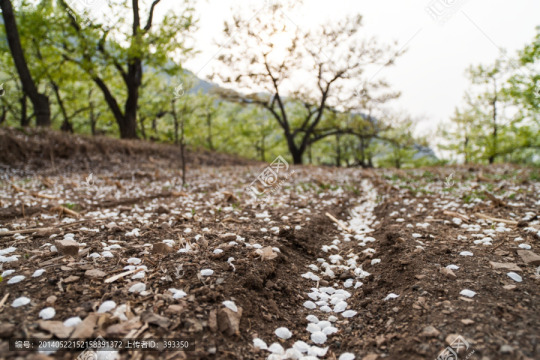
(Source)
The sight of pear blossoms carpeting the ground is a marker of the end of Spring.
梨 lí, the word for pear in pear blossom is a homophone of 离 lí, parting, and this coupled with its image of fleeting, fragile beauty often leads to association with grief and/or mourning. Following from there, the image of a ‘sorrowful woman confined in the boudoir as her youth passes’ is easily linked and a common accompanying theme. (Yes it’s a trope xD I’ll point it out again in the future as we encounter them.)
Side note: Taking the ‘unfavoured concubine’ reading of this poem, the fact that the sun isn’t down, yet the yard is littered with flowers that likely have been there for a while and there are no servants attending to that - all of this just emphasizes ‘unfavoured’. Few would make that extra effort on a team with no future!
Empty courtyard
It is getting dark, the day growing colder and it is so very quiet in this house. The loneliness is the trigger for her tears; both the quiet and the empty courtyard from which Spring is receding only amplifies it.
Setting sun
黄昏 huáng hūn is sunset. Literally, it reads yellow-dim/dark. The movement of the light is the only thing in this poem. The sunset is gradual, dimming from the warm yellow tones of the setting sun to shadows and darkness. But the fallen white petals and flowers in the courtyard are going to be very visible until the very last of the light is gone.
In this poem, each line is a different, standalone image that stacks to build the atmosphere, expressing 春怨 perfectly.
Framed by her silk screen window, the sun goes down on her gilded house where there is no one to see, or no one who will care to see her tears. Her emotion overflows this evening because the loneliness has grown to fill her neglected yard, and she is accompanied only by the silence and the last remnants of her Spring. There is nothing for her outside, and no one comes. The door does not open.
Some pictures...
It's a rather depressing note to leave this post on, so I thought it might be on interest to all of us how a palace or a house might have looked!
Here is the scene of a banquet in a Tang Dynasty palace as imagined by an artist of the Five Dynasties or Song Dynasty some two to four hundred years later.
This painting is from the The Metropolitan Museum of Art. Visit the source for the writeup and description!

(Source)
This is an imagining of how a Tang (618 - 907) Palace concert might have looked like by a Yuan (1279-1368) Dynasty artist. Again, check out the description at the source!

(Source)
17 notes
·
View notes
Text
OP I have never heard of this poem or the poet, but I recognize the translated words! Thank you for providing his name because it made googling much easier.
This is a 5 character regulated verse about 试眼镜 / trying on glasses ~
《试眼镜》 by 孔尚任
西洋白玻璃 市自香山噢
制镜大如钱 秋水涵双窍
蔽目目转明 能察毫末妙
暗窗细读书 犹如在年少
西洋 | 白 玻璃 / 市 | 自 |香山噢
xīyáng | bái bōlí / shì | zì | xiāngshānō
Western | white glass / traded | from | Heong San Ou [1]
制 镜 | 大 如 钱 / 秋水 | 涵 | 双窍
zhì jìng | dà rú qián / qiūshuǐ | hán | shuāng qiào
manufactured lenses | big as coins / autumn waters [2] | encompass | both eyes
蔽目 | 目 转 明 / 能 | 察 | 毫末 妙
bìmù | mù zhuǎn míng / néng | chá | háomò miào
before the eyes | sight turns clear / able to | observe | miniscule marvels
暗窗 | 细 读书 / 犹如 | 在 年少
ànchuāng | xì dúshū / yóurú | zài niánshào
dim window [3] | meticulously reading / as if | still in youth
[1] old name for macau
[2] they are limpid; this is also often a descriptor for eyes
[3] a window which opens to someplace indoors as opposed to directly outside, hence the dimness without natural light
"I put them on—it suddenly becomes clear; / I can see the very tips of things! / And read fine print by the dim-lit window / Just like in my youth."
Read it here | Reblog for a larger sample size!
73 notes
·
View notes
Text
Fandom Peeps to Get to Know Better
I was tagged by @dcderringer.
3 Ships You Like: Mei Changsu & Fei Liu, Voldemort & Harry and Xiao Jingyu & Xiao Jingyan & Lin Shu - because familial and platonic relationships are also ships ok!
First Ship Ever: LelouchXSuzaku from Code Geass
Last Song You Heard: 山鬼 by winky诗
Favorite Childhood Book: King of Shadows by Susan Cooper
Currently Reading: The Lantern and the Night Moths by Yilin Wang, 李贺 Li He's poetry
Currently Watching: 大理寺日志 (2016) White Cat Legend - the donghua, not the live action!
Currently Consuming: Bibigo seaweed and grape vitagen
Currently Craving: A hot pot of flowery osmanthus tea
Tagging @fateandloveentwined, @yilinwriter, @fishylife, @tofufei, and anyone who wants to give this a go ~
8 notes
·
View notes
Text
some news...
I was planning to trial changes to poetry post format and content on this blog, but the plans were a little ambitious and I, too easily distracted. Maybe gradual shifts would work better instead? I've been stuck on how to start for toooo long. So, here we are!
Sharing my thoughts for input and accountability xD
For a start, poets will be split from the main poetry post. Each will get their own little bio writeup where details of their family & friends, lives, careers, random anecdotes, gossip & speculation of their private lives and such will be covered.
Next the poetry form will also be a seperate writeup.
Both poet and poetry form posts will be updated as I learn more about them over time.
Poem translations and their commentary will remain the same with links to those topics above where needed. Further details about the poet that are relevant/specific to the poem e.g. travel mapping, will be within these posts, then mentioned and linked to the main poet posts.
A con of this plan is that it means the poet post would be a 'live document' so to speak. And I'm not sure how to handle that but hey YOLO. We can always test things out as we go!
(Leaving the other thing I wanted to do out of this for a while. Beyond a rough outline, I haven't even started!)
8 notes
·
View notes
Text
Two translators each give their take on a Li Qingzhao lyric, then collaborate on a third translation - all with extensive footnotes, an explanation of the poetry form and the author's bio. We don't see translations presented in such a format much, so I'm very delighted to get this insight and behind-the-scenes peek into their considerations and feels.
I have some new co-translations of Li Qingzhao's poetry out in Glyphoria, a publication created by Metatron.
Living in the Song dynasty, Li Qingzhao was China's most celebrated female poet. The poem I translated is my favourite poem of hers and touches on female friendship and sisterhood.

#omg i love this#it's such a fun way to engage with a poem#friends they even marked out the tone pattern so you can feel the rhythm of the lines#this is my favourite thing to see in translations#(honestly im a bit jealous xD i want to play like this with someone too!!!)
71 notes
·
View notes
Text
I AM BACK!!!!!
With 17 poems translated and a story written out of them too.
Here is 11k (poetry translation inclusive) on the Tang Dynasty poet, Li He (790 to 816), written for Yuletide 2023.
In the next couple of posts over this month, I will be trying a new way of presenting poems that I've only thought about but never ventured into. What I did for this fanfic project was what finally inspired me to go for it \o/ It's going to be fun and rambly, and I'm super looking forward to it.
16 notes
·
View notes
Text
Nirvana in Fire 2023 (Mini) Exchange
Did some interest check in the LYH Discord server and looks like some folks are still interested in NIF Exchange, so I guess we’re doing it!! Thanks to the mods for letting me intern this year. <3
A also did a lovely banner for us. Thank you!


Nirvana in Fire 2023 (Mini) Exchange is now open for sign-ups!
46 notes
·
View notes
Text
2023 Schedule
September 15th: Last day of signing up for the event.
September 17th: Usernames of partners will be sent out through direct messaging, please have your DMs open.
September 20th: Send your first ask/reply by this date so I know that you have received all the information correctly and you still want to participate.
October 17th: End of the event, reveal to be sent to partners.
13 notes
·
View notes
Text
晚风 - Evening Wind
youtube
A version of me [1], high up, looks afar [2];
there is a cloud that has stopped.
Planning a stealthy capture,
to the Night, Dusk now belongs [3].
Within the dense forest, lights flicker resolutely, flying along.
And the drifting heart? Suspended.
‘Til the curtain of the night envelops.
The night has grown deep,
stars lighting
the colours of the way back home [4].
Summer's evening wind - it blows.
Like someone’s embrace, there’s… lingering warmth.
Take all the tender stories, knead them in ‘til they are one with the night,
and with that distance [5], forgotten.
People pass by each other
and parting ways, scatter.
The evening wind this night - it blows.
Like our inhale, exhale, there’s… lingering warmth.
And our story, from our first meeting it fades, ‘til distance separates [6] us again;
we had thought ourselves in love.
We pass by each other.
A goodbye, and we’ve parted.
The evening wind this night - it blows.
Like our inhale, exhale, there’s… lingering warmth.
And our story, from our first meeting it fades, ‘til distance separates us again;
we had thought ourselves in love.
We pass by each other.
A goodbye, and we’ve parted.
...............................................................................................
I heard the first line in the two minute version of this song subbed by @halfxin on twitter and dived for youtube for the full thing, then ended up listening to it on a loop for the longest time. So, here's an impulse translation from me xD
Have also since watched her subbed MV lyric video and it is so lovely <3 I really like her interpretation and phrasing for the song. Special shoutout to 'while the fluttering heart remains unsettled until the dusk closes around it' and 'blending our sweet story thoroughly into the colors of the night to be set aside and forgotten' - it makes them so vivid!
[1] 某个我 (mǒu gè wǒ) - Literally, a certain 'me'. I heard this and was immediately 100% invested. Is it a version of yourself across possibilities, or a past, present, future self?
[2] 眺望 (tiào wàng) - Being high up and looking still further. It feels like freedom, it feels like peace. Someone said, the last cloud drifting idly by will not stay. But this one stayed!
[3] 夜幕把日落拥有 - I have always had the biggest soft spot for anthropomorphizing nature, and this is so so so cute? The curtain of night taking the sunset as its own.
[4] 归途 (guī tú) - Literally, return journey, doesn't actually specify that the return must be 'home'. But there is only one place I would say I 归 to. And that's home. So this is a personal choice.
[5] 疏离 (shū lí) - Not just 'distance'. It feels like isolating, like emotional detachment.
[6] 隔阂 (Gé'hé) - Now this is emotional detachment that leads to barriers in emotions and communication.
某个我 眺望着
有片云朵停驻了
计划秘密地捕捉
夜幕把日落拥有
密林里闪烁执着 飞着
飘着的心呢 悬着
到暮色四合
夜晚更深了
星星点亮着
归途的颜色
夏夜的晚风 吹着
像谁的拥抱 余热
把温柔的故事全部都揉进了夜色
疏离地忘了
人们从身边经过
再各自散了
今夜的晚风 吹着
像彼此呼吸 余热
而我们的故事相遇再褪回到隔阂
自以为爱着
我们从身旁经过
一别就散了
今夜的晚风 吹着
像彼此呼吸 余热
而我们的故事相遇再褪回到隔阂
自以为爱着
我们从身旁经过
一别就散了
9 notes
·
View notes
Text
Thoughts on 【长喑 】Part 1/3
This is a response to the lovely @fateandloveentwined’s translation of the Xiao Jingyan fansong 长喑: LONG DARKNESS — CHÁNG ÀN 长喑 TRANSLATION
Fate, thank goodness you so sensibly divided this song into four eight parts (no idea why I thought it was four lolol). It helps to not have it too spread out, because there is always this temptation to ramble about every single detail, isn’t there? xD This way it’s easier to focus on the bigger picture.
// I’m splitting this in three to spread out my writing energy evenly. But also it’s okay right? We’re probably the only ones Like This about this song anyway HAHAAH.
About the title, I wonder if 长喑 can be read as a loud ringing war cry, or else the voice of a singing sword. 喑 is fairly frequently used for sobs, but I have also seen it as the scream of war horses (possibly one of Li Bai’s? I can’t find it again though and am too lazy for a more thorough search haha). Which ties in well with the themes and imagery of war, sorrow for the wronged, fighting back with everything you have, and firmly carrying on in spite of loss.
长剑出鞘冷锋芒 十三载意难忘
缓歌曼舞九重宫 朔风黄沙麾旗扬
手足血脉埋青冢 挚友良弓唯锈藏
岂能折腰屈膝没忠良
Xiao Jingyan being represented as the sheathed sword, that comes out undulled and deadly!!!!! It's such a vibe that I can hear the ringing. Through the past 13 years, that emotion and those feelings haven't been forgotten.
Love that you mention the context of that line from 长恨歌 being carefree and blissful early days! These melodies and dances in '九重宫' elevates the setting to such metaphorical heights. Just putting 九重 in there gives it a majestic, magnificent feeling. The highest peak, the noble palace, their idyllic days of youth, gone in bitterly cold winds blowing on battlefields.
The imagery in 朔风黄沙麾旗扬 | north wind / yellow sands / ensigns billowing, are such common representations for war. (An example from one of Li Shimin's more famous poems recounting the horror and tragedy of war, goes 寒沙连骑迹 朔吹断边声 | across cold sands, the cavalry’s trail; the north gale cuts off sound at the frontier, and afterwards, beginning to describe the victory 扬麾氛雾静 纪石功名立 | billowing standard, hazy fog, they quiet; steles bearing their merits and honors, are erected).
Just. That contrast is SO good!
THIS ‘brothers-in-arms and brothers in blood’ FOR 手足血脉 !!!!!!!!!!
Also, veryyyyy nice rhythm and rhyme in your translation on the third line. The ring of ‘long covered in grass’ versus ‘left only to rust’ is so lovely...
I wonder if the use of 青冢 - the verdant tomb - is deliberate - given previous imagery of the harsh northern winds and the sands. How eye catching, their burial mound rising above. Another imagery-metaphor handshake maybe?
And I couldn’t help but be drawn to the contrast 冷锋芒 cold-razor sharpness of the sword, and 唯锈藏 the rust on the bow, put away to gather dust. (Time to step up and reveal your talent and virtue Xiao Jingyan, for your friend and brother who was murdered, because he outlived his use and became an imagined threat… Yes, I went there with the puns. :P)
Were you thinking of 埋没 as in bury for 没忠良? I kind of read it as both having the loyal, true and good killed, but also forcing those left to bend their knee and submit, suppressing themselves. Can’t think of any way to express both layers, but burying them is definitely more in keeping with the theme of these two verses.
挑灯不眠千军帐 逐千里护家邦
玉壶冰心铁骨铮 扬眉冷看覆风浪
当时少年且横枪 凝尽碧血守四方
守国土河山定国安邦
The first line makes me so soft. So so so soft. In it, I see the fiery passion of Xin Qiji’s 破阵子:
醉里挑灯看剑 梦回吹角连营
Drunkenly, lifted a lamp to gaze upon the sword - dreamed back of when horns were blown throughout the army’s sprawling camp,
八百里分麾下炙 五十弦翻塞外声
meat and wine sent out to the men, singing strings and music played loud, here at the frontier:
沙场秋点兵
The battlefield in Autumn, a mustering of the troops.
I see a quiet, unyielding spirit and infinite care in Lu You’s 病起书怀:
病骨支离纱帽宽 孤臣万里客江干
Ailing bones so gaunt, the gauze hat grows loose; a lone official travels far, a guest by this river.
位卑未敢忘忧国 事定犹须待阖棺
In lowly post, daring not to forget concern for the country; even matters decided must be waited out to their ends.
天地神灵扶庙社 京华父老望和銮
Heaven and Earth, Gods and Deities, help our devout state; all the People hope for the war chariots’ ring.
出师一表通今古 夜半挑灯更细看
Northern Expeditions, the Memorial applies in times ancient, present; the night half-past, I lift a lamp, reading closely.
And you know, maybe the use of 家邦 is to maintain that ending -ang sound with 浪 | làng and 方 | fāng, but it just feels so much homier than 家国 somehow. Do you get that feeling?
挑灯不眠千军帐 逐千里护家邦 feels like someone who is so sincere. Leaders who care, people who care. We can see it in their actions.
In the next line, again with the contrasts - but this time so inspiring???? 玉壶冰心铁骨铮 An unchanging, pure heart cold and clear and untainted as ice. It sounds so sincere but somehow fragile. But no fear! He also has a spine of steel - 铮 like the sound of weapons ready to clash in battle.
OMG 扬眉冷看覆风浪 ‘head high, brows lifted, he coolly looks to the tempestuous, overturning storms’ THIS IS SO JINGYAN I LOVE IT. Just these two lines. It hurts that he is so disappointed. That it sometimes must feel like the corruption is everywhere, and the good must submit and hide or else be eventually ousted. It must taste like ashes… There is a fic I really like that asked in the narration, is there value in 风骨 / conviction? And Xiao Jingyan’s answer is: there is. And that’s just so very him.
I’ll indulge myself for the next bit and just say, I feel like the hint of 赤血长殷 Loyal Blood Runs Forever, the Mei Changsu character song (FAV!!!!) is stronger in this part. Things like:
且横枪 vs 横长枪 换却离愁
‘still danced their spears’ vs ‘parting woe traded for leveled spears’
凝尽碧血守四方 vs 倾余生风骨同守
‘blood of the honourable, thoroughly consecrated, defends the four corners of their homeland’ vs ‘pouring the remainder of our lives and strength into protecting together’
守国土河山定国安邦 vs 守我山河家国依旧
‘guarding rivers and hills to secure peace of the kingdom’s earth’ vs ‘guarding my kingdom, my home, as before’
They really are very similar people in some ways.
5 notes
·
View notes
Text
Adjacently related to what I share here, so I thought I’d reply on this blog!
We had cable TV, which was where I watched all the TVB drama in my childhood - only my grandmothers had it in their rooms, so I watched with my popo on weekdays after school and also on weekends when she went to stay with my cousins. They had re-runs of the dramas from weekdays on weekends, except marathon style, so you can catch up on missed episodes maybe LOL
On regular TV, we had one or two channels for each target audience group and for the two Chinese channels, there would be dramas at certain timeslots daily. I usually watched with my parents in the evening at dinnertime and before bedtime. If we liked the drama a lot, we’d look for VCDs locally. I have no idea if they were bootleg or not xD One of my go-to shops is still around - I see outlets in malls and central-ish locations!
These are the dramas I remember from the mid 1990s to the 2000s.
Wikipedia (w), Youtube (y)
TVB (Hong Kong) Dramas
To a certain degree, all my impressions of mythology, wuxia and historical settings came from this period... the modern dramas also influenced me to take a path in my studies that I didn’t end up pursuing as a career, but it was very fun while it lasted anyway. Also! I wasn't the only one. Met friends in school who told me they had the very same source of inspiration!
(Notice how most of them have fairly normal English names? xD Gosh, those were the days...)
Mythology / Fantasy
西游记 (1996) Journey to the West (w) (y)
西游记贰 (1998) Journey to the West II (w) (y)
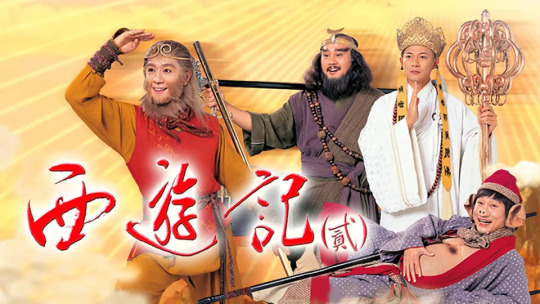
封神榜 (2001) Gods of Honor (w) (y) - Investiture of the Gods adaptation
缱绻仙凡间 (2003) In the Realm of Fancy (w) (y) - The amazing twist at the end has me crying every time. If you do give it a try, don’t spoil yourself on wikipedia (I am SO amused and amazed and delighted by that entry, because it means someone loves it enough to write that much on an obscure drama in another language hahaha)

人龙传说 (2006) Dragon Love (w) (y) - Shenanigans between a dragon and an aspiring dragon slayer \o/ I loved this drama so much.
Wuxia
笑傲江湖 (1996) State of Divinity (w) (y)

云海玉弓缘 (2003) Lofty Waters Verdant Bow (w) (y)
大唐双龙传 Twin of Brothers (w) (y) - Adapted from the novel of the same name. I cannot remember any of the plot, but I heard the first line of the opening theme song while looking for another drama one day, and was like WAIT A SEC -
Timetravel
寻秦记 (2001) A Step Into The Past (w) (y) - THE Timetravel back to ancient times drama, based on the novel of the same name

九五至尊 (2003) King of Yesterday and Tomorrow (w) (y) - Yongzhen Emperor goes forward in time with his would-be assassin, another fav!
隔世追兇 (2004) To Get Unstuck in Time (w) (y) - Crime solving across time! (technically no time travelling though) I found this one again when I watched the kdrama Signal and was like !!!!!!!! apparently they were inspired by the same movie.
Historical
洗冤录 (1999) Witness to a Prosecution (w) (y) - My coroner-led crime investigation competence kink had to have come from somewhere right?
酒是故乡醇 (2001) Country Spirit (w) (y) - This drama is its title. There will always be a space for it in my heart. Perfect encapsulation in the Eng title too! (Though it may not be obvious in first glance)
金枝欲孽 (2004) War and Beauty (w) (y) - The Empress Dowager of palace drama, I see shadows of it in so many others of this genre. Only noticed the cool wordplay in the original title after I got re-interested in Chinese things and shoutout to the genius who thought of combining 金枝玉叶 (people of nobility or delicate natures) + 欲 (desire) + 孽 (sin)
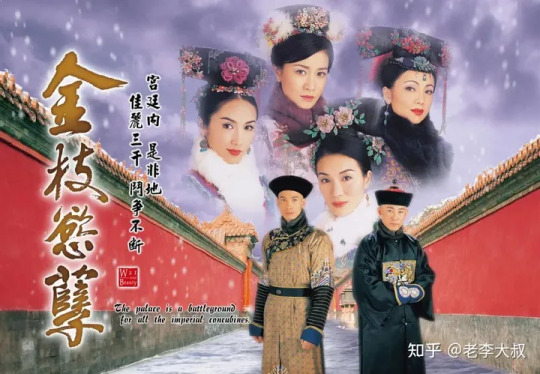
Modern
妙手仁心 (1998) Healing Hands (w) (y) - simply iconic

勇探实录 (2001) Law Enforcers (w) (y) - Got distracted watching a bit of this while digging it up (theme song unforgettable!!!!), and it is so weird but I still feel comfortable with this style of acting and script.
争分夺秒 (2004) Split Second (w) (y) - Police vs. Triads & moles on both sides. In hindsight, it makes perfect sense that the character who has stayed rent free in my head for nearly 20 years is... (friends who know my taste can probably guess lmao)

法证先锋 (2006) Forensic Heroes (w) (y) - Probably just as iconic as Healing Hands xD

Taiwanese Dramas
Fantasy
第8号当铺 (2003) The Pawnshop NO.8 (w) (y) - Absolute top fav of all time. What a concept. Excellent execution.
youtube
Period
小宝与康熙 (2000) Duke of Mount Deer (w) (y)
Modern
情定愛琴海 (2004) Love of the Aegean Sea (w) (y) - Original tragic fav. My mom was obsessed. I think we watched it at least 4 times. ~ ni shi wo de yi di lei ~
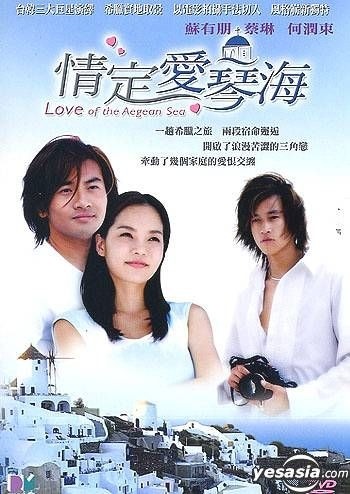
綠光森林 (2005) Green Forest, My Home (w) (y) - I remember watching this because at certain angles, the male lead looked like Ming Dao. Bad time to have this realization, but Huang Xuan has elevated Ming Dao vibes !!!!!! ...Is this why I like him???? LMAO.
白色巨塔 (2006) The Hospital (w) (y) - I'm not sure how well recieved this drama was, but when I think of hospital drama... it's this one. (And maybe the Korean Good Doctor xD)

愛情魔髮師 (2006) The Magicians of Love (w) (y) - On a lighter note... this is a super fun childhood fav. Hairstylist shenanigans with good acting and a lighthearted script.
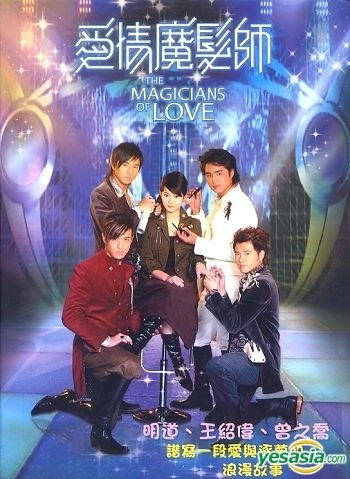
Mainland Chinese Drama
Adaptations of Jinyong's Novels
倚天屠龙记 2003 The Heaven Sword and Dragon Saber (w) (y)

天龙八部 (2003) Demi-Gods and Semi-Devils (w) (y) - I don't need to say anything. This version is iconic enough! (Also featuring Liu Tao as A'Zhu xD)
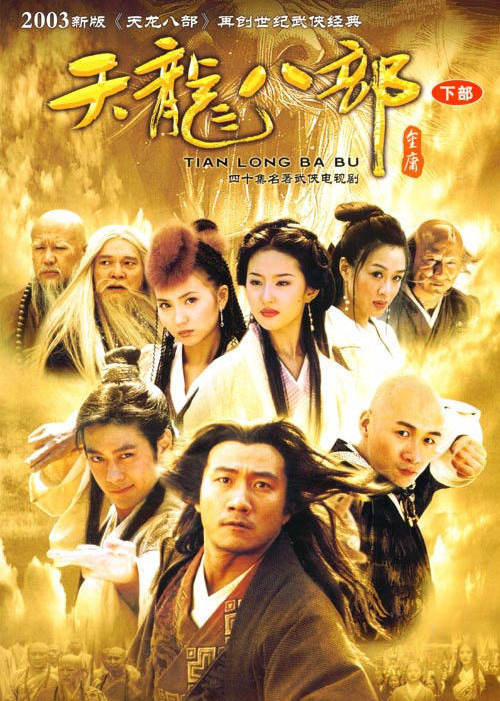
射雕英雄传 (2003) The Legend of the Condor Heroes (w) (y)
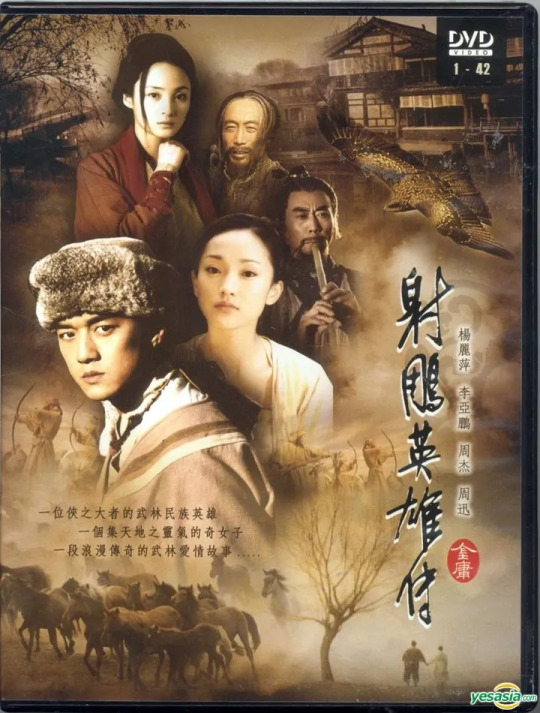
神雕侠侣 (2006) The Return of the Condor Heroes (w) (y) - by the same director… gods, Liu Yifei is just so iconic in this era of Jinyong adaptations T_T
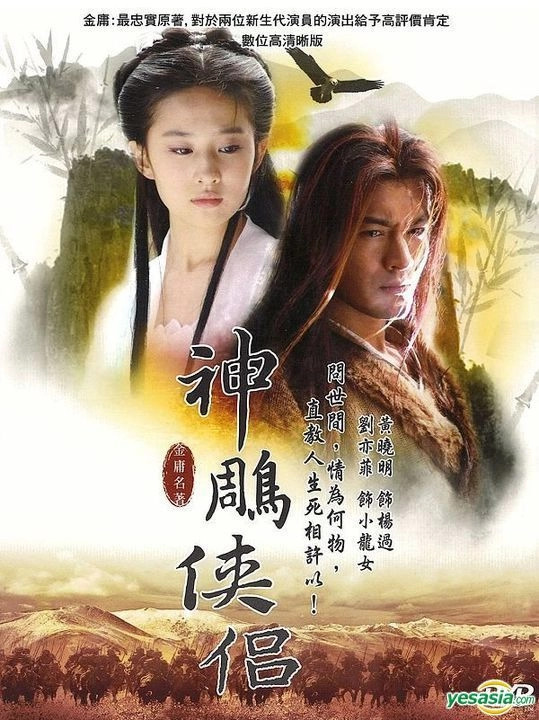
射雕英雄传 (2008) The Legend of the Condor Heroes (w) (y) - I would say this one is the most idol drama-y out of all of them, but gosh am I soft for this version.
youtube
鹿鼎记 (2008) Royal Tramp (w) (y) - I was once dubious, but this production won me over. The ending song OMG.
Period Fantasy / Supernatural / Mythology
赤子乘龙 (2005) The Dragon Heroes (w) (b)
天外飞仙 (2006) The Little Fairy (w) (y) - Led by Hu Ge and Ariel Lin! Two years later, they co-stared again in a Condor Heroes adaptation. Iconic opening song!
聊斋奇女子 (2007) The Fairies of Liaozhai (w) (y) - Beautifully made. I'm thinking of rewatching now that I do know my way around poetry a little better haha.
Of course Chinese Paladin as Ponz mentioned deserves a place here!
Historical
These are the ones I remember:
Princess Returning Pearl ofc also as mentioned by Ponz
少年包青天II (2000) Young Justice Bao (w) (y)
少年包青天II (2001) Young Justice Bao 2 (w) (y) - I finally solved the mystery of why he seemed to have two different faces LMAO there were multiple seasons!!!!
大汉天子 (2005) The Emperor in Han Dynasty (w) (y) - ending song that makes me cry.
刁蛮公主 (2005) My Bratty Princess (w) (y) - not based on real history, but quite cute xD
清宫风云 (2006) Heroic Legend of the Chin Dynasty (w) (y) - LOVE the opening song
for modern AU fics - what chinese media did diaspora consume?
making this post because some of us in the diaspora server were having a chat about what Chinese media "Diaspora Chinese" watched in the 90's - 2000's (and even sooner than that) while not having access to satellite chinese media or streaming services - this is in the context of writing modern AU fics based off Chinese media/novels (so your main character's grandpa or uncle is not, in fact, watching an episode of Friends or Shortland Street or something as flavour text because sorry what the hell-)
We generally watched a lot of stuff on VCDs, including bootlegged and non-bootlegged movies, shows, anime/donghua. My household had a whole VCD album of this, and a lot of VCDs (even if they were pirated editions) would have a fancy hardcover box with a magnetic clasp and some artwork representing the show on it.
All of this is Mandarin - so not TVB stuff, because I'm from Northern China and I don't know any cantonese - but Canto friends, please feel free to add to the list! This is mostly stuff my parents liked to watch, or I liked to watch with them, with the exception of a few which I mainly watched with friends/cousins when I was maybe twelve years old onwards. This is a pretty personal list, meant to give people general idea of a possible "ballpark" of sorts, and by no means exhaustive.
Now, for the list of shows which I can confirm I had or someone I know had on VCD or some kind of offline media format lol (I'll try add release year stamps and links to the EN wikipedia where possible):
Period dramas (mostly Qing Dynasty stuff):
Huan Zhu Gege 还珠格格 (1998, April-) This is a classic, so many memes come from this show; hugely popular series, basically cemented Zhang Tie Lin's face as the face of the Qing Emperor for about a decade.
Tie Chi Tong Ya Ji Xiao Lan 铁齿铜牙纪晓岚 (2002-2010) - I loved this show as a kid and watched all four seasons on repeat with family... The "trio" in this show are well known and loved.
Amazing Detective Di Ren Jie / 神探狄仁杰 (2004) A very popular and addictive show.
Ok now the Big Four:
Romance of 3 kingdoms 1994 / 三国演义 (1994) - a classic that has had many remakes, my older cousin would play this on repeat...
Hong Lou Meng/红楼梦 (1987) - another classic with many remakes, but I think the most recognised by the public one is the 1987 one.
Journey to the West / 西游记 live action (1986) - I think the 1986 version of the live action is the most recognised one.
*Shui Hu Zhuan / 水浒传 (1998) - I am not too familliar with the live action of this one in my household tbh bc my mum doesn't like it lol (she keeps saying it's too depressing) but I'm sure it's up there with the rest of the big four, if anyone has an opinion on this one please let me know!
Modern setting shows:
My dad loved all the Sun Honglei (孙红雷 - actor name) stuff, iirc it was a lot of MinGuo period espionage stuff, your shanghai 1920's sxc aesthetic. This actor has been around since 1999? Qian Fu (潜伏)was very famous, and Ren Jian Zheng Dao Shi Cang Sang (人间正道是沧桑)。 These were around '08 and '09.
Chuang Guan Dong - 闯关东 (2008) (Baidu link, sorry - couldn't get an EN wikipedia one). This show was huge when it was airing, everyone was watching it. I was pretty young but even I watched it and got invested ... and I thought it was such an "old person" show at the time lmao.
Xiao Bing Zhang Ga / 小兵张嘎 (2004) (sorry, again Baidu link) - yo, anti-japanese war movies set between 1937-1945 were crazy popular - this is one of them and was very popular):
Donghua/Anime (all the stuff kid me watched and some which I didn't but were popular):
喜羊羊与灰太狼 (2005-)
Calabash Brothers / 葫芦兄弟 (1986-1987)
Black Cat Detective / Hei Mao Jing Zhang 黑猫警长 (1984-2010)
Lan Mao Tao Qi 3000 Wen 蓝蓝猫淘气3000问 AKA 蓝猫 (blue cat) (October 1999 - Present)
Legend of Ne Zha 哪吒传奇 (2003)
Journey to the West/Xi You Ji 西游记 This was truly the Donghua I grew up on, the OP song and ED song are classic bangers all kids know.
Slam Dunk/ 灌篮高手 - People truly watched a lot of anime that may or may not have been terribly dubbed into mando (possibly canto too). Late 80s and 90s kids were all over this, and Dragon Ball.
Taiwanese Dramas:
This is mid-late 2000's, I would be remiss to not talk about the Taiwanese dramas of this era. Mike He, Rainie Yang, Wu Zun (amongst many, many others) were huge. Stuff like Dou Niu Yao Bu Yao, it started with a kiss, Hua Yang Shao Nv (Taiwanese version of Hana Kimi) were all pretty popular. Not sure if these shows all hold up in 2023, but boy were they popular at the time.
Note about CNY:
For CNY, people would try to tune into 春节联欢晚会 (the CCTV official CNY show) at that One Friend Who Had China Satellite TV's house. Zhao Ben Shan / 赵本山 was a comedy staple, and the show would often feature people from the music industry to perform. Eventually these people became more and more relevant to my gen and Jay Chou etc started appearing.
Last but not least Xian Jiaaaan 仙剑:
In 2005 I was all over 仙剑奇侠传 (Chinese Paladin), based off the video game. This show was crazy popular and probably sent me and a whole lot of other kids into Xianxia / Wuxia hell (and Hu Ge hell, and later I came back to love Liu Yifei). Thank you. The OST is a true banger.
143 notes
·
View notes
Text
Announcing the Langya Kink List
Langya hall is the most mysterious place in the world but as long as one is willing to pay in silver, they may find the answers they seek. However, this time, the young master of Langya is looking for something different from silver. (No one has asked if the master of Langya hall is rather perverse, but that might be a question, soon enough everyone will know the answer to.) This year, for the first time ever, Langya hall introduces a new list - a list of kink prompts. For a week, Langya hall will accept it as payment if you add anything to its library - pleasure or pain, joy or shame. There is no taboo here as we invite scholars, poets, artists, musicians and all kinds of masters from around the world to join us in this festival of kinks from May 13 to May 21!
12 notes
·
View notes
Text
Reminds me of this particular cover of the song 想着你的感觉 (how it feels to miss you):
youtube
每一次我走近 Every time I approach,
总是那么悄悄地 it's always so secretly,
不敢使你讶异 not daring to surprise you
让你发觉自己是幻影 lest you discover that you are a figment.
每一次我唤你 Every time I call out to you.
总是那么细细地 it's always so delicately,
不让寂寞听到 not allowing Loneliness to overhear,
嘲笑我用温柔的声音 and mock me for my voice's gentleness.
一个一个想你的日子 Each and every one of the days I've thought of you
砌成一栋孤单的房子 has been laid into a house that stands alone.
我在上楼下楼开门关门 I go upstairs and down, close and open doors,
翻著抽屉寻着你名字 scour through drawers in search of your name.
一个一个想你的日子 Each and every day I've thought of you
从你回眸而去那天开始 beginning from that day you looked back and left;
我的日记写成诗 the records of my days are poems,
诗的背后寻着你名字 between the lines of poetry, a search for your name.
想着你的感觉 Thinking of you feels like
有如雨的缠绵 the lingering of rain,
淋湿我的岁月 its dampness has seeped into my days,
而我却依然不知不觉 yet I still do not notice that it is there.
想着你的感觉 Thinking of you feels like
有如风的缱绻 the breeze, unabating,
吹乱我的日夜 blowing my nights and days into disarray,
吹也吹不走你的容颜 it blows, it blows, but your face - it cannot blow away.
一个一个想你的日子 Each and every one of the days I've thought of you
砌成一栋孤单的房子 has been laid into a house that stands alone.
我在上楼下楼开门关门 I go upstairs and down, close and open doors,
翻著抽屉寻着你名字 scour through drawers in search of your name.
一个一个想你的日子 Each and every day I've thought of you
从你回眸而去那天开始 beginning from that day you looked back and left;
我的日记写成诗 the records of my days are poems,
诗的背后寻着你名字 between the lines of poetry, a search for your name.
想着你的感觉 Thinking of you feels like
有如雨的缠绵 the lingering of rain,
淋湿我的岁月 its dampness has seeped into my days,
而我却依然不知不觉 yet I still do not notice that it is there.
想着你的感觉 Thinking of you feels like
有如风的缱绻 the breeze, unabating,
吹乱我的日夜 blowing my nights and days into disarray,
吹也吹不走你的容颜 it blows, it blows, but your face - it cannot blow away.
想着你的感觉 Thinking of you feels like
有如雨的缠绵 the lingering of rain,
淋湿我的岁月 its dampness has seeped into my days,
而我却依然不知不觉 yet I still do not notice that it is there.
想着你的感觉 Thinking of you feels like
有如风的缱绻 the breeze, unabating,
吹乱我的日夜 blowing my nights and days into disarray,
吹也吹不走你的容颜 it blows, it blows, but your face - it cannot blow away.
[looks for you in everything] [finds you there]
#想着你的感觉#容祖儿#i love this song so much#我的日记写成诗#诗的背后寻着你名字#was a devastating line#like whoa#i also love the phrasing of days i've missed you stacking up into a house of loneliness#that's just - it makes you FEEL it#her 总是那么细细地 with that SMILE#you're like awwwww#and then 发觉自己是幻影 comes like a knife for your SOUL#personifying Loneliness is such an exquisite touch#because reality and unreality have become so tangled in her sadness#and aaaaaaaaaaaaaa?#the lingering note on 颜 T_T#the second repetition of verse two and three are SO DESPERATE#or more like... intense?#the first time felt like searching the first time#and like yeaaaaah we can go again#i know this is how songs work#but HAHAHAHA THE BUILDUP REALLY WORKS#time is passing she's doing it again and again#the pre-peak 想着你的感觉 was so peak emotions tho T_T EVERYONE WAS TEARING UP#good editing LOL#the last one already felt cathartic and when she gentled it made sense#i love this cover#Youtube
96K notes
·
View notes
Text
赋得古原草送别 - Composed from: Bidding Farewell on the Ancient Grass Plains
by 白居易 (Bai Juyi, 772 - 846)
离离原上草 一岁一枯荣
lí lí yuán shàng cǎo yī suì yī kū róng
Flickering grasses upon the plain, a year, a cycle of withering and verdant glory.
野火烧不尽 春风吹又生
yě huǒ shāo bù jìn chūn fēng chuī yòu shēng
Ravaging wildfire does not burn it all; a spring breeze blows and again, they grow.
远芳侵古道 晴翠接荒城
yuǎn fāng qīn gǔ dào qíng cuì jiē huāng chéng
Distant fragrance encroaches ancient roads; sun dappled green takes the desolate city.
又送王孙去 萋萋满别情
yòu sòng wáng sūn qù qī qī mǎn bié qíng
Again, seeing off a dear friend on their way, the lush field is full of these parting feelings.
………………………………………………………………………………………….
NOTES
To @liberty-or-death, thanks for the rec which brought this poem back on my radar. I’m so glad we do this - I always learn so much!
Check out her meta and thoughts on this work in the mdzs context.
This is a fun poem in that if you look at only the first four lines, you get one genre of poetry - praise for nature, but if you take it as a whole, you get another type - a farewell poem. In fact, I had no idea that it had a second half. It’s so popular that if anyone asked pre-cnovel era YJ what it means, she would have been able to answer too - but only the second and third lines…
A variation of 野火烧不尽 春风吹又生 is a common idiom which is also used a lot (truly a LOT) in various novels and cmedia, mostly in the context of ruthless or pragmatic characters going ‘斩草不除根 春风吹又生 (if you cut grass but don’t get rid of their roots, then when the spring wind blows they’ll grow again). This phrase is a convergence of this poem and a quote from 左传 zuǒ zhuán, The Commentary of Zuo, which recounts the major political, military, and social events of the Spring and Autumn period, and was written more than a millennium before Bai Juyi was born. In the section for Duke Yin, Year 6, it goes:
君子曰,善不可失,恶不可长,其陈桓公之谓乎,长恶不悛,从自及也,虽欲救之,其将能乎
The lord said, goodness must not be lost, evil must not be nurtured in its growth, this must apply to Duke Huan of Chen. Having nurtured the growth of evil without rectification and about to reap his just deserts - even desiring to salvage this situation, how can it be done?
商书曰,恶之易也,如火之燎于原,不可乡迩,其犹可扑灭,周任有言曰,为国家者,见恶如农夫之务去草焉,芟夷蕴崇之,绝其本根,勿使能殖,则善者信矣.
In the Book of Shang it says, the ease of evil’s flourishing is akin to fire spreading on the plains; it cannot be approached, can it then be extinguished? Quoting Zhou Ren, ‘a person responsible for country and family, at the sight of evil, must behave as the farmer whose priority is to rid the land of weeds, does: cutting them down, gathering them and eliminating them from their very roots so that they may not grow again. Thus allowing goodness to develop.’
And yes, I didn’t go off on a tangent on Zuo Zhuan for nothing. There is a clear resemblance between the metaphor used here and the imagery in Bai Juyi’s poem, and that is probably how they ended up linked together in association with characters locked in conflict.
Title
Here’s something new in the title! The words 赋得 fù dé actually indicate the category for this poem by its origin - via prompt, and can be read as roughly equivalent to ‘composed from’. The prompt itself is the following sentence, 古原草送别 gǔ yuán cǎo sòngbié (ancient plain’s grass, bidding farewell). For this type of poem, how carefully the format is maintained whilst sticking closely to the topic and fulfilling the prompt, is a critical test of the poet’s skill.
Such prompts may come from lines of existing poetry, songs, essays or themes. The earliest example of such that we have today is 《赋得翠石应令诗》 written by 萧雉 Xiao Zhi of Liang Dynasty during the Northern and Southern Dynasties period. Though the later 应制 yìng zhì (by Emperor’s order) type of poetry are also titled with these two words to indicate their type, it is only one reason of many! The origin of such a prompt may vary from being administered for tests of ability, to exams, to friendly games or even just to say ‘I was inspired by this!’.
Background
Pre-dive notes: I suspect this is another one where I’ll end up eyeballs deep in a stack of books sans punctuation and in traditional chinese - and if I’m deeply unlucky, only handwritten. Why am I so excited??????? LMAO. Been dragging my feet on everything up till this point.
The story that comes with this poem isn’t one that can be found in some personal recount or diary entry from the poet. One half comes from 《幽闲鼓吹》, a collection of anecdotes about the upper echelons of the Tang Dynasty, emperors and generals and famous literary figures of the middle and late Tang period, covering Emperor Xuanzong, Emperor Xianzong (元和 Yuanhe) and Emperor Wuzong (会昌 Huichang) of Tang. The other half comes from 《唐摭言》which is a collection of short stories from the Tang Dynasty (618-907) compiled by Wang Dingbao (870-940), mainly about the state examination system. Emphasis on these two collections being anecdotes to be read for amusement, not verified events. But I guess we can take this with the same serving of salt as we might for a ‘know your meme’ entry!
From 《幽闲鼓吹》
白尚书应举初至京,以诗谒顾著作。顾睹姓名熟视白公曰,米价方贵,居亦弗易。乃披卷首篇曰, ‘咸阳原上草,一岁一枯荣,野火烧不尽,春风吹又生‘ 即嗟赏曰,道得个语,居即易矣,因为之延誉,声名大振。
Minister [1] Bai, newly arrived at the Capital to sit for the imperial examinations, brought poems on his visit to a man by the surname of Gu to show them to him. Gu saw his name and observed him intently, saying, “Grain is expensive, living here won’t be easy [2].” He then opened to the first page and read, ‘The grass of Xianyang Plains, a year, a cycle of withering and verdant glory; wildfire does not raze it all, spring winds blow and again they grow’ and sighed in admiration at once, “living here will be easy (for you).” And because word of this praise got out, his (Bai Juyi’s) name became very very well known.
[1] The highest post he ever held was Minister for the Ministry of Justice
[2] This was a play on the words of his name, taken literally it can be read 白 bái (for free) 居 jū (live, as in to live in a house) 易 yì (easy). Oh, get thee to a punnery! xD
From 《唐摭言》
唐白居易初举未振,以歌诗谒顾况。况谑曰。居易。长安百物贵,居大不易。及读至赋得原上草送友曰。野火烧不尽,春风吹又生。叹曰。有句如此,居大不难。老夫前言戏之耳。
Tang Dynasty’s Bai Juyi had just passed the imperial exams, but had not made his name yet. He visited Gu Kuang with song and poetry. Mockingly, Kuang said, “‘To lodge easily’? [1] In Chang’an, everything is expensive. It’s not easy to live in a big place.” It was only after reading, ‘Written for bidding farewell to a friend on the plains: wildfire does not raze it all, spring winds blow and again they grow’, that he sighed, “With wordsmithing like this, living in a big place won’t be difficult at all. Consider all I said before a joke.”
[1] Another play on Bai Juyi’s name.
There are slight differences even between these two accounts. Not to mention the question of whether this gentleman Gu Kuang was even actually in the capital at this time. From my brief skim of his Wiki page, it seems he was having trouble at the tail end of his career, and lived out his retirement in seclusion. Records are clear that Bai Juyi passed the imperial exams in 802 along with friend Yuan Zhen, whilst Gu Kuang’s whereabouts were not possible to track down (at least for me) and he passed away in either 806 if baidu is to be believed, or after 820 according to wiki.
Two things that are immediately obvious as I read these passages:
The first, line one reads 咸阳原上草 xiányáng yuán shàng cǎo (the grass upon Xianyang Plain), whereas the version I got from gushiwen and also the ‘popular’ ~modern~ version goes, 离离原上草 lí lí yuán shàng cǎo (dense and lively, the grass upon the plain).
The second, that the title is written:
赋得原上草送友 (Composed from: Seeing off a friend upon grass plains)
vs
赋得古原草送别 (Composed from: Bidding farewell upon the ancient grass plains)
Consulting another source first published in Southern Song, Chapter 30 of 《苕溪渔隐丛话》, its first half completed in 1148 (this copy is owned by Harvard, and the edition was published in 1740 or 1741… if I’m reading the description correctly), backs up the 咸阳原上草 version.
Which then brings us to the question, when did these lines get changed?
I have no clue, so I asked google xD. Most answers point to Sun Zhu’s (1722–1778) 《唐诗三百首》 Three Hundred Tang Poems. But it's hard for me to verify at this point because many of the collections which hold this poem were reprinted in the 20th century. I sampled two texts randomly in ctext, and both had the 离离/古原 version… even Bai Juyi’s own anthology 《白氏长庆集》, so named because its first print was in the Changgeng Era, second in Emperor Muzong of Tang’s reign. The version in the image below was from 《白氏长庆集》 in an anthology of classics published in 1922, and it has exactly that same 古原草送别 title and 离离 beginning.
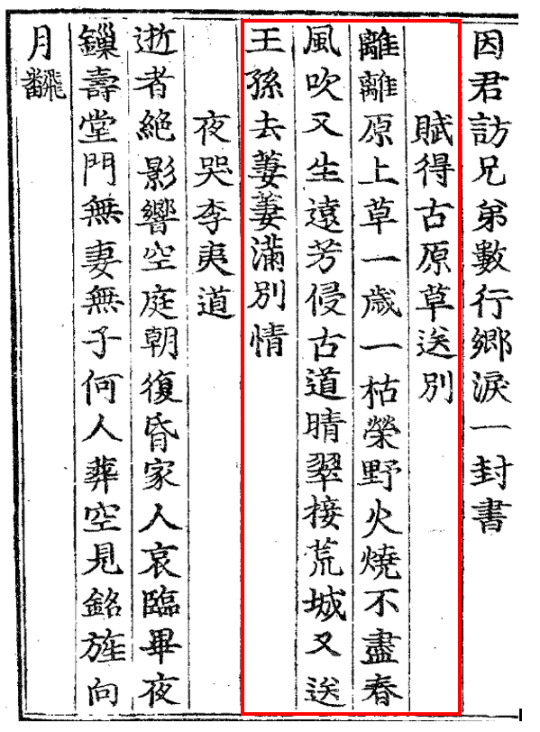
I feel like if the original indeed began with 咸阳原上草, and was titled 赋得原上草送友, it would make sense in a later edit that changes 咸阳 (location) into 离离 (adjective) to then clarify what information is lost - that this farewell happening on ‘ancient plains’ - in another place like the title. In any case, I do believe there is a good reason for the change, no matter my personal preference… Let's get to that in the next section.
Poem
First, note that based on the prompt, the things available to be played with are:
A grass plain (as background)
Emphasis on grass
Seeing off someone
And off we go!
Diving right into exploring the more interesting words or expressions in this poem, I’d like to draw our attention to 离离 (of course), 王孙 and 萋萋.
Though not a word you see often, on sight, 离离 feels like it speaks of parting, because read alone, the word 离 is to leave, to part. But the next natural step is to look up past usages. By past, I mean pre-Bai Juyi’s lifetime and ideally from texts and poets he would have read with care.
Pre-Qin, we have two winners from 诗经 the Book of Odes, Airs of Wang, Drooping Millet. In this poem, 彼黍离离 (the millet either droop or sway). From Minor Odes, Clear Dew, 其实离离 (the fruit of trees hand down). Some person from Han - some websites attribute the poem to Cao Cao, some to Empress Zhen - says, 蒲生我池中,其叶何离离 (bullrushes grow in my pond, how dense their leaves).
That’s about it for relevant poetry.
And then 易经 《䷝离》 The Book of Changes tells me how to interpret trigrams:
离,丽也;日月丽乎天,百谷草木丽乎土,重明以丽乎正,乃化成天下。柔丽乎中正,故亨;是以畜牝牛吉也。
‘离’ is ‘to rely on’. The sun and moon rely on the heavens, the myriad grassess and trees rely on the earth; light upon light relies on the right path, illuminating all under heaven. The gentle in their positions, middle and fair are hence fortunate, so female cows are fortunate…?
Okay LOL that last one got a bit away from me, but basically, the trigram called 离 (or the trad version of it anyway) is associated with fire, spring and radiance. And who knows if these associations do or don’t spill over into word selection in everyday life?
So 离 is parting and 离离 can be in turns, drooping, swaying, verdant, radiant and full of life.
We can have 王孙 and 萋萋 up together because having them both in a sentence brings 楚辞 The Songs of Chu, 招隐士 Summons for a Recluse’s line, 王孙游兮不归,春草生兮萋萋 (the noble man remains there and does not return, the grasses of spring are growing luxuriantly). From this poem, we can infer that 王孙 is referring to the recluse (On the topic of the ‘image’ of recluses in literature, I leave this link: ARTICLE REVIEWS: HOUSE OF HERMITS). Such recluses in the time that poem was written could also be the descendants of noble houses. But the word itself also has meaning - it is literally, grandson(s) of kings or princes, and was also used to collectively refer to young noblemen, eventually just young men in general. Maybe similar to how gentlemen is used? Idk.
And 招隐士 is quite an influential poem. Those three things, 王孙, 春草 and 萋萋 were used often in later works to evoke specific feelings of melancholy despite the beauty in the surroundings, because someone is far from home.
(Some unconfirmed rumours in the Old Book of Tang suggest that Bai Juyi may have been descended from the Mi imperial house of the State of Chu, and the Bai family who left Chu for Qin due to prosecution by the King of Chu. But that is neither here nor there. If true, it may have been part of the inspiration for interpreting the poem’s prompt in this way. Just an interesting titbit of information!)
Now that we have the new, uncommon words out of the way, I wanted to try recreating the experience of reading this piece because it’s such a feast for the senses. And I hope this works, because if not it’s going to look quite ridiculous indeed.
离离 / 原上草 // 一岁 / 一枯荣
bright / grass upon the plains // one year / once wither & flourish
Flickering grasses upon the plain, a year, a cycle of withering and verdant glory.
野火 / 烧不尽 // 春风 / 吹又生
wildfire / burns not end // spring breeze / blows to life again
Ravaging wildfire does not burn it all; a spring breeze blows and again, they grow.
远 / 芳 / 侵 / 古道 // 晴翠 / 接 / 荒城
distant / fragrance / assails / ancient road // sunlit crisp green / joins / desolate city
Distant fragrance encroaches ancient roads; sun dappled green joins the desolate city.
又 / 送 / 王孙 / 去 // 萋萋 / 满 / 别情
again / sending / noble men / away // verdant greenery / full / parting feelings
Again, seeing off a dear friend on their way, the lush field is full of these parting feelings.
There are lots of contrasts that bring these words to life. 离离 is associated with verdant, luxuriant growth and blades of grasses or millet. The unquenchable life in that green against the red of the fire, the grass on the plains that even the fire cannot entirely destroy, because deeply hidden ‘neath the ground, its roots are safe. One breath of the wind and it's growing again! Triumphant in its victory, it goes on to overtake the ‘ancient road’ and the ruins of a city. The word used to describe its action at the road is literally 侵 invade, the word for its action with the city 接 can be read as join, but can also be to receive or take over.
And so I think you can see where this is building up to the last line where the grass, abundant, full of life and absolutely everywhere as far as the eye can see, is like his overflowing emotions in the moment of parting.
I really appreciate the crossing over of what is real and what is imagined, anchoring with the image of ‘grass on the plains’ and bringing us through time, through fire and across space - over the winding road and up to the abandoned city. Is the grass really there? Maybe. Did all of this really happen? Who knows. But these feelings after going through all that are certainly real!
Another thing I love is the cinematic acceleration effect for that year with the grass, and then the panning where you follow someone's gaze from the road to the city led on by the greeeeeeeeen. The pacing is so atmospheric as well! 一岁一枯荣 is slow, solemn and glorious. 野火烧不尽 is an intense battle for dominance and 春风吹又生 a breath of fresh air.
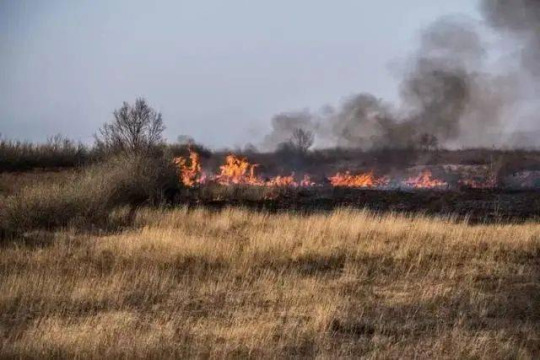
(Source)
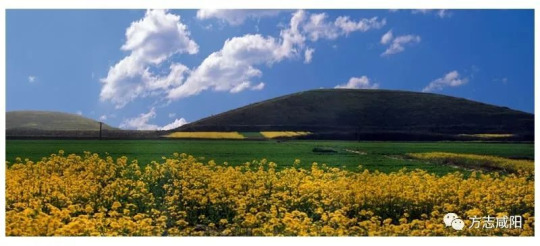
(Source)
As I was reading the poem for the first time though, there were some things I wondered idly about, which were then answered as I looked into its background and asked around some.
Grass has a 1 year lifecycle????
Apparently some species, yes. Where I live, it’s just green year round unless someone doesn’t water them during a dry spell. In other places with actual seasons, they can stay green for a while under snow or get frozen while green, which is amazing to me, even if they do eventually yellow. If summers are scorching, they may brown (I think that’s when they die?). Anyway, it’s cool and I can’t believe I never thought about this before.
Are wildfires a Thing on grassland?
If the sun is hot enough or if conditions are right for dry lightning it can happen, but I don’t know if spontaneous combustion is a thing on this particular field, but I somehow doubt that.
Which ancient field is this happening on?
Xianyang Plains, which is a real place! It is now known as Wuling (五陵) Plain, where the mausoleums of 28 Han and Tang dynasty emperors stand.
Where is the old road and the ruins? Are these actual places or just there for the vibes.
Xianyang (咸阳) was the capital of the Qin empire. It was sacked and burnt to the ground, supposedly by Xiang Yu, a rebel leader against the Qin in 206 BC. The founding emperor of Han Dynasty later built his capital just across the river from the ruins of Xianyang. In fact, the ruins are still there!
The photo below is of a Qin Dynasty handmade armor factory found in 2019 at the location of the old Xianyang City. Analysis of the materials found there was a match for armor in Qin Shihuang’s Mausoleum.
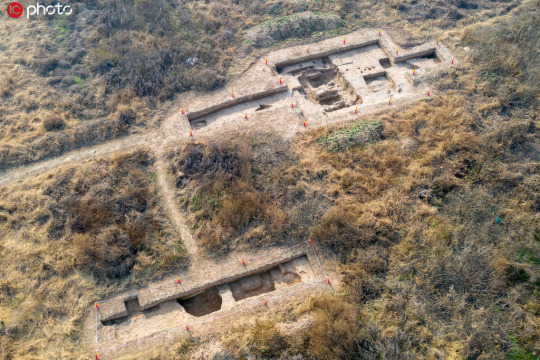
(Source)
So the thing about Han Dynasty and Tang Dynasty, is this…
Qin Dynasty spanned 221 BCE to 206 BCE; its capital was Xianyang.
Han Dynasty spanned 206 BCE to 220 CE; its first capital was Chang’an.
Tang Dynasty spanned 618 CE to 907 CE; its first capital was Chang’an.
Xianyang was there first, it was ravaged by fire. Then the Han Chang’an was built on the opposite bank. Then Tang Chang’an was built Southeast of the ruined Han Chang’an (it’d been through a lot of wars by that time LOL). So are they the same thing? No. But if the ruins of Xianyang are still here for us today, they certainly would have been there back in Bai Juyi’s time. And they would also have been considered ancient ruins, wouldn’t they?
Here’s how the area looks like on google maps.

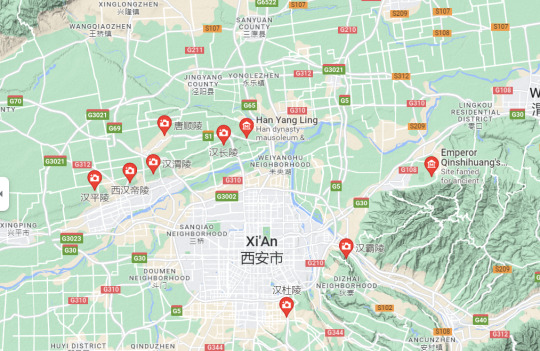
Back to sleuthing for reasons behind word choices.
A thing that caught my ear was the keyword 古道! There are so many poems that use that image-impression, but also also, most of ALL: this classic song. Secondary to that though, there’s 小桥流水人家 古道西风瘦马 (a little bridge, running water and homes; on the ancient road in the west wind, a lean horse) of Yuan Dynasty - and after Bai Juyi’s time, and Li Bai’s (701 to 762) 咸阳古道音尘绝 (on the ancient road to Xianyang, ended is the music and the dust), which he’ll certainly have come across.
I got a bit distracted reading farewell poems and was shook to discover that Wang Wei’s (701 to 7062) even more famous farewell poem, iconic line: 西出阳关无故人, is actually, set at almost the same place.
渭城朝雨浥轻尘 | Weicheng’s [1] morning drizzle moistens the dusty road.
客舍青青柳色新 | By the traveller’s inn, the willow’s green is fresh
劝君更尽一杯酒 | Friend, do drink up one more cup of wine;
西出阳关无故人 | West beyond Yang Pass, there’ll be acquaintances none. (You’ll have no one)
[1] 渭城 wèi chéng, previous, older name for the county that later became Xianyang County during the Qin Dynasty.
Knowing all this, when a poem uses Xianyang, fire, ancient path and desolate city as imagery, one can’t help the mind being drawn to that fire which burnt a palace, a city to the ground, the lives lost. And then wandering still further... who are you bidding farewell to?
So! While 离离 for the first two words brings beautiful imagery, contrasting against the ravaging fire and parallels to 萋萋, 咸阳 provides associations with location, history and builds on impressions to tie the whole poem together.
Let me know which you prefer!

(Source)
Translation Recs
Something a little different this time, for those who are still with me.
Because this is such a famous poem, I thought it would be fun to look up other translations! Here’s a list of recs for ones I liked best.
In no particular order:
I enjoyed the brief writeup on Bai Juyi’s background and commentary on the poem’s relevance in vacantmountain’s: TRANSLATION THURSDAY: 赋得古原草送别 BIDDING FAREWELL ON THE PLAIN, BY 白居易 BAI JUYI
Despite what OP says about their own translations seeming rigid sometimes due to their style (and intention for translations), I didn’t find it so. And in fact, I really appreciate how this translation leans closely in to the original words, while still reading smoothly: 152 白居易 賦得古原草送別 translation: Farewells on Grassland, by Bai Juyi
It’s a little further down the page - you may have to search for ‘grass’. I found the concept of utilizing space in this way an interesting one. Perhaps you may too! Daryl Lim Wei Jie brings us: Grass
#赋得古原草送别#白居易#chinese poetry#poetry#FAREWELL POETRY#WHAT IS MY TAG FOR THIS LMAO#i probably should clean up my tags at some point#everything hurts from me sitting down too much to finish this xD it's suddenly 11pm where did all the time go#it was 8 when i sat down????#anyway this was fun!!!!!#a simple poem#but with history
46 notes
·
View notes